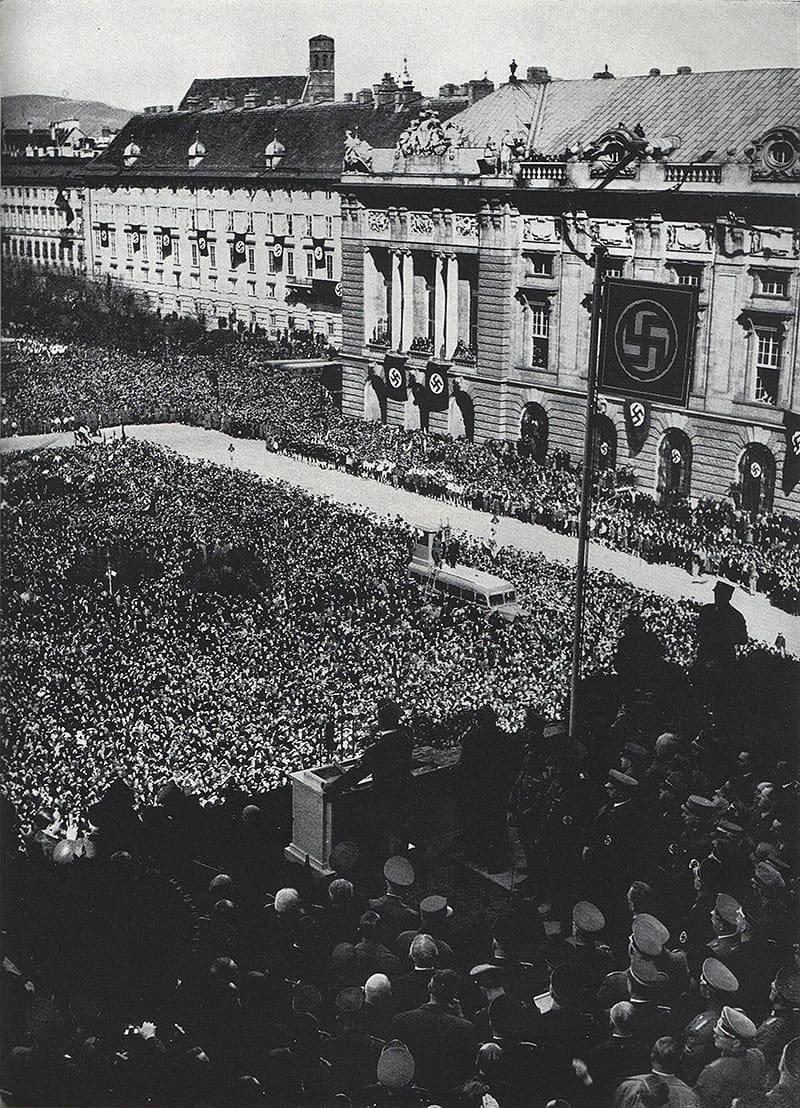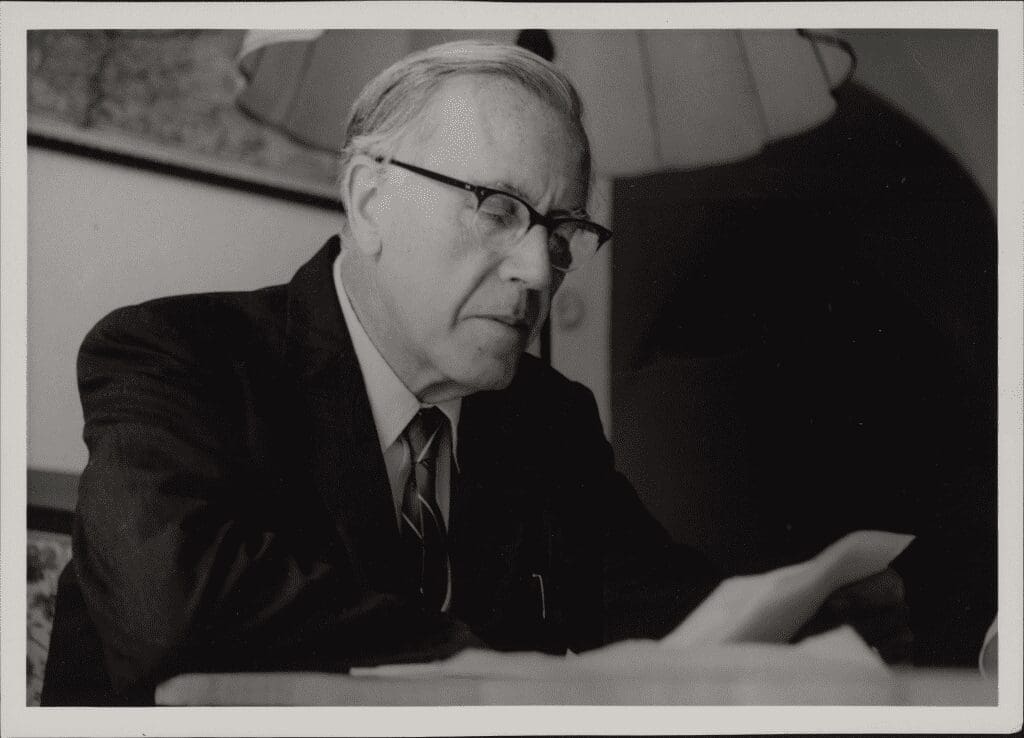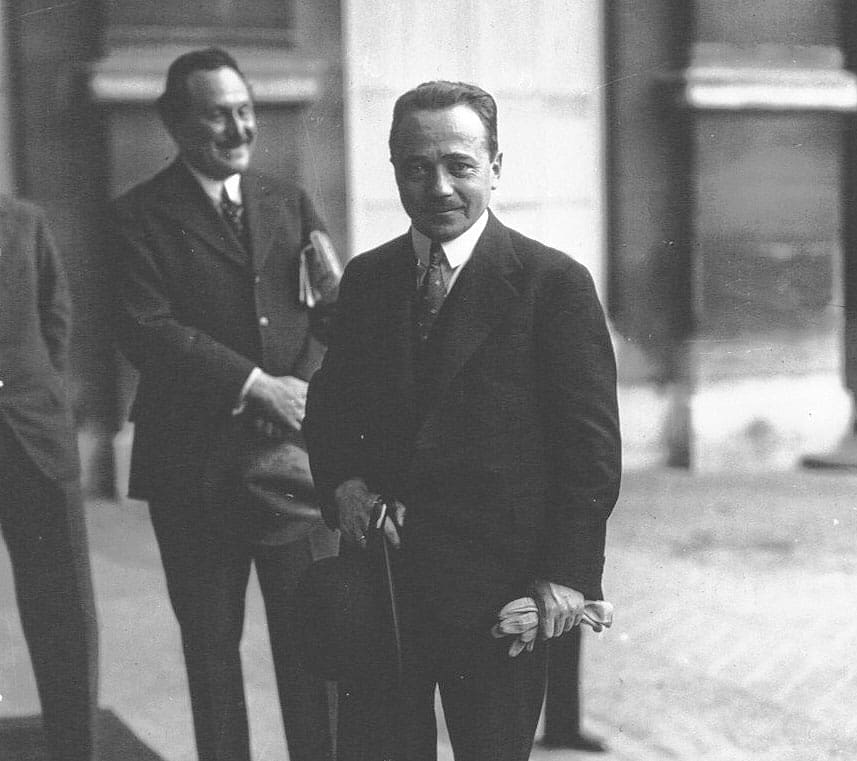I
In 1933 Dietrich von Hildebrand, the German phenomenologist and Catholic convert, fled his country. As a critic of Nazism and anti-Semitism, von Hildebrand did not want to live in the place Germany had become. And as someone who had once before, at the time of Hitler’s 1923 failed Beer Hall Putsch, been placed on the Nazi hit list, he judged he would risk the concentration camp by staying. Only by going into exile could von Hildebrand keep his integrity and evade any plans Hitler might make against him. As far as credentials go, opposing Hitler at the risk of the camp is perhaps the height of moral achievement in the contemporary imagination. If von Hildebrand’s political activities had consisted solely in anti-Nazism, his reputation as a “philosopher in the world” would be unimpeachable.
But there was more to his politics than that: upon fleeing Germany, von Hildebrand took to Austria, where Engelbert Dollfuss’s regime gave him support and shelter to continue his intellectual fight against Nazism. Dollfuss, who in von Hildebrand’s own description led an authoritarian government in Austria, commanded not only von Hildebrand’s qualified support but even his love and admiration. This period of von Hildebrand’s life raises questions that his book What Is Philosophy?, originally published in German in 1950 and recently released in a new edition by the Dietrich von Hildebrand Legacy Project, can help us explore.
Philosophical Background: Husserl and the Neo-scholastics
Dietrich von Hildebrand was born in Italy in 1889. His father, Adolf von Hildebrand, was an accomplished sculptor. Starting at age seventeen, Dietrich studied philosophy at the university level, eventually befriending Max Scheler and completing doctoral studies under Edmund Husserl, the German philosopher whose work inaugurated the philosophical approach known as phenomenology. Husserl praised his student, saying about von Hildebrand’s dissertation, “This dissertation I have studied with great joy. I would almost say that the genius of Adolf von Hildebrand was inherited by his son, the author, in the form of a philosophic genius.” Von Hildebrand was eventually given a position at the University of Munich. When the Nazi annexation of Austria occurred, von Hildebrand believed he was, if anything, in even more danger than when he left Germany, and he fled once again, ultimately landing in the United States, where he taught philosophy at Fordham University until 1960. He died in 1977.

What Is Philosophy? is a work of epistemology, informed by von Hildebrand’s understanding of phenomenology. Before looking directly at What Is Philosophy?, however, it will be helpful to step back and look at the career of Edmund Husserl, for Husserl’s Catholic reception provides crucial background to von Hildebrand’s work. Catholic scholastic philosophers believed that Husserl’s Logical Investigations, which were published in two volumes in 1900 and 1901, helped create a way for them to enter into a new dialogue with modern philosophy.
As Edward Baring explains in his book Converts to the Real, Husserl’s Logical Investigations was enthusiastically received by “progressive neo-scholastics,” Catholic philosophers who conceived of themselves as working within the scholastic and Thomistic philosophical traditions, but who believed contemporary exponents of these traditions should do more than merely restate traditional scholastic doctrines in traditional terms. Rather, they wanted to engage modern philosophy, taking it seriously and being taken seriously by it, even while continuing to distance themselves from what they took to be errors characteristic of much modern philosophy. For these neo-scholastics, modern philosophy tended to hold that all judgments are subjective, that human minds cannot reach objectively true judgments. In addition, they thought, modern philosophy denied the ability of human minds to access the real world, a true and objective reality outside the mind. Husserl’s work provided them with a way to avoid these modern errors, reaffirm some traditional scholastic doctrines, claim Husserl as a modern guide in their quest to update scholasticism, and incorporate true contemporary insights of phenomenology and other contemporary philosophical work into their own writing.
Specifically, though neo-scholastics did not believe that judgments were merely subjective, they believed that modern philosophy was correct to analyze the subjective aspect of knowledge—the way in which human beings in their own subjectivity came to grasp objective truth. Traditional scholastic thought had focused on the objectivity of truth and had not reflected in a sustained way on the interplay of knowledge and subjectivity. Husserl’s value lay in the way he analyzed mental acts and human consciousness with a special attention to how objects are given in experience. Neo-scholastics, therefore, found in Husserl’s work a methodology that allowed them both to address a lacuna in scholastic thought—a deeper engagement with subjective processes of knowledge—and retain their commitment to the objectivity of judgment and the accessibility of a mind-independent reality.
However, in 1913 Husserl released a new work, Ideas for a Pure Phenomenology, which in its turn toward a “transcendental idealism” disturbed and unsettled neo-scholastics. Unlike other versions of idealism, Husserl’s new position did not characterize the external world as merely a figment generated by the human mind, for the world still “transcends” the human mind in his view. But in his account, the way reality appears or is given in experience to human minds entails that reality is still in some sense dependent on the mind, and neo-scholastics believed that this move conflicted with their understanding of mind-independent reality. Husserl had pushed the focus on human subjectivity further than they wanted to or could go. The dream of using Husserl’s phenomenology to build a bridge from modern to medieval thought appeared to be dead.
Husserl would continue down the path set by the Ideas, but neo-scholastic proponents of the phenomenological method, including von Hildebrand, did not follow him. Instead, they deepened their original interpretations of phenomenology rooted in their readings of the Logical Investigations. As von Hildebrand writes in What Is Philosophy?,
The term “phenomenology” has already assumed an ambiguous character today. One meaning of phenomenology is that which Husserl gave to this term after 1913, in his Ideas and all subsequent works . . . but a completely different meaning of phenomenology is in strict, radical opposition to any idealism. It is this meaning of phenomenology that we find in the writings of Adolf Reinach, Alexander Pfänder, myself, and several others, and that we, at least, identified with the meaning of phenomenology in the first edition of Husserl’s Logical Investigations.
As an intervention in this family dispute, much of What Is Philosophy? has a technical character that will be of interest mostly to academic philosophers. On the whole, this work is an elaboration of the “realist” phenomenological tradition’s view of concepts like intuition, a priori knowledge, genuine essences, and related matters. The ultimate purpose of these reflections, from the point of view of the work’s title, is to describe the precise kind of knowledge that philosophy deals with; describing this kind of knowledge is von Hildebrand’s answer to the title question. However, for those uninvested in the most technical parts of What Is Philosophy?, the book contains more general reflections that engage broader questions about the role of philosophy in human life and human society, questions that played out directly in von Hildebrand’s life.
Philosophy, the Naive Sense, and the Right Kind of Distance
Dietrich von Hildebrand’s vision of philosophy has both democratic and aristocratic elements. On the one hand, he believed that only an intellectual elite can truly do philosophy. “Only a few,” he writes, “possess the intellectual capability to attain to a real and autonomous philosophical knowledge.” Ordinary people, on the other hand, will have to absorb genuine philosophical insights in a non-intellectual manner. It’s through seeing philosophical truths embodied in “certain classical personalities who intuitively reflect philosophy in their ethos, that is, upon great poets, statesmen, and the like,” that most people come to accept philosophical insights—precisely “not as theoretical, but as embodied truths.” For most people, “philosophy appeals not to their minds . . . but to their naive sense.”

Dietrich von Hildebrand
Von Hildebrand pitches his elitism too strongly here. Though most people do not attempt to achieve the technical sophistication that characterizes academic philosophy, it doesn’t follow that they can never grasp specific philosophical insights theoretically, that a philosophical truth can never appeal to their mind.
If this view, however, threatens to seal off philosophy proper from the ordinary person, von Hildebrand’s idea of naive sense also builds a more democratic orientation into his overall account of the nature of philosophy. As a phenomenologist, von Hildebrand always wants to maintain philosophy’s connection to that which is given in experience, including in the naive experiences of ordinary people:
There exists no gap between the naive worldview and the worldview of true philosophy, at least no gap like the one we find between physics and the naive view of the world. . . . True philosophy still shows respect for all that discloses the object to us in a naive living contact. Thus, the philosophical analysis of beauty or love does not sovereignly disregard what these contents disclose in pre-philosophical, living, organic experience. . . . It not only broadens and deepens but also rectifies the naive aspect.
Though philosophy may have to “rectify” what is given in naive experience, it can’t simply disregard ordinary experience, or lose contact with organic reality. To do so is a great philosophical sin for von Hildebrand. Philosophy must always “consult reality” to avoid “any imprisoning of ourselves in concepts.”
Philosophy that loses this kind of contact with reality proceeds according to a false philosophical distance, one that risks what von Hildebrand calls “inorganic, theoretical, pre-systematic knowledge.” This kind of “knowledge” is “the home of all dilettantism, all pseudo-evidence, all ‘shortcuts’ to conclusions, all shabby rationalistic theorizing.” In this kind of engagement with objects in the world, “the mind emancipates itself from all naive lived experience and relies completely upon its theoretical ability of knowing.” This process results in “a caricature of genuine knowledge because it lacks genuine self-criticism and a systematic character.” Von Hildebrand calls the “worldview” that springs from this kind of detached philosophizing “the kingdom of doxa” (which he defines as false common sense) Philosophy exists in part precisely to destroy this kingdom, which includes inorganic theoretical knowledge as well as “idols.” “Ethical values,” von Hildebrand notes, “such as generosity, the forgiving of a wrong suffered, selfless love, flash up in the most intense moments of naive experience, only to be obscured later on by idols like ‘honor,’ revenge, and so on.”
If there is a false kind of philosophical distance from reality—that which creates the kingdom of doxa—there is also, for von Hildebrand, a true kind of philosophical distance. This true philosophical distance occurs when one “begins to look at the world in wonder instead of taking it for granted.” It entails a stepping back from the “whirl of the actual,” from “the entanglements of the concrete situation,” from pragmatic concerns, from the everyday familiarity with objects that prevents us from posing philosophical questions about them. By taking this kind of distance, “the philosopher frees himself from all obstacles that hinder his mind from ‘listening’ to the voice of being and prevent the object from disclosing itself in all its plentitude and mysterious depth.” Through genuine philosophical distance, we can enter what von Hildebrand calls “the kingdom of truth.”
True philosophical distance occurs when one “begins to look at the world in wonder instead of taking it for granted.”
For von Hildebrand, true philosophical distance is a key prerequisite for doing the kind of philosophy he thinks is open to only a few, but those outside the world of technical academic philosophy can still ask after what role this distance can or should have in our lives. If part of the point of taking this distance is to step back from everything that could block our perception of the truth, from all everyday pressures that try to untether us from the truth or prevent us from seeing the world accurately, then philosophical distance is valuable to ordinary people in many ways, including when they find themselves caught up in political debates or situations, as von Hildebrand himself was.
The Enemy of My Enemy Is My Friend
In his stand against Nazism, von Hildebrand saw clearly that charged political situations put a wall between minds subject to the kingdom of doxa and philosophy’s liberating touch. To see exactly how he analyzed the illusions that other Catholics entertained about the Nazi regime, we can look to his memoir, My Battle Against Hitler. In it, he pours scorn on Catholics who could not or would not approach Nazism with moral clarity. For example, in March 1933, after the burning of the Reichstag, von Hildebrand spoke at a conference put on by the Catholic Academic Association. At the event he conveyed his surprise to the association’s vice president that the conference had not been cancelled in light of the political situation. In response, the vice president instead expressed pleasure at a friendly telegram he had received from Franz von Papen, then vice chancellor of the government Hitler led as chancellor. He, the vice president, remarked that a previous chancellor would not have sent a telegram like that. “For an organization,” von Hildebrand writes, “whose very raison d’être was to suffuse all things with the spirit of Christ, one would be hard-pressed to conceive of anything more grotesque than to judge the Antichrist’s rise to power by whether the Association was treated cordially by the government.”
Again and again in his memoirs, von Hildebrand criticizes those who cannot see obvious moral and political facts about Nazism. After he delivered a lecture in Paris in April 1933, he was invited to a dinner at which the provincial of a German religious order was present. At one point the provincial remarked, “We Catholics have to put ourselves in the front ranks of National Socialism and in this way give everything a Catholic turn.” Von Hildebrand replied, “National socialism and Christianity are absolutely incompatible and besides it is a terrible illusion to think that Catholics would be able to influence this movement by means of compromises.” Reflecting on hearing of Catholics who said in 1933 “that the only thing still necessary was for Hitler to find his way to the faith and convert,” he comments,
This was a horrible blend of equivocation and an attempt at self-deception. To begin with, there is far more to be decried in Hitler than his personal lack of faith, namely his entire gruesome doctrine, the totalitarian state he had created, and the spirit of all his collaborators. . . . Had Hitler actually converted, he would in consequence have had to dismiss all his subordinates, dissolve the Third Reich, and immediately turn himself over to a court of his many crimes. . . . Certainly one should pray for him, as one should pray for every criminal, for the eternal good of his soul, but one should simultaneously pray that he be removed from his position as soon as possible, that Germany and the entire world be freed of him.
About a specific individual who entertained illusions about Hitler converting to Catholicism, von Hildebrand remarks, “He did not want to see that it would be far more horrifying if Hitler committed all manner of awful deeds while at the same time adopting a positive and friendly stance toward the Church.” Still again, after a speech in which Hitler had “uttered many expressions about peace and his love of peace,” von Hildebrand writes, “The duplicity and dishonesty of these phrases were as clear as day to me. But unfortunately, not for many other Catholics in Germany, who were eager to shelter themselves in an illusion.”
All these people had, for various reasons, fallen into the kingdom of doxa. As von Hildebrand saw it, whether from self-preservation, wishful thinking, crude nationalism, or philosophical error, they were in the grip of illusions that obscured their vision. If they had been able to take a greater philosophical distance from their situation, perhaps they could have perceived reality and the truths given in ordinary experience more clearly.
This sensitivity about the illusions created by politics, however, falters as von Hildebrand’s memoirs progress to the next period of his life. After he fled Germany, von Hildebrand lived for a time in Italy. During his stay there, he became impressed with Engelbert Dollfuss, the chancellor of Austria, and with Dollfuss’s opposition to Nazism. He intentionally relocated to Austria, which he saw as an important site of battle against Hitler. He and a collaborator were excited about the possibility of “offering our services to Dollfuss as intellectual officers in this battle.” To support the Dollfuss regime in its opposition to National Socialism, they decided to start a “Catholic, antiracist, and anti-totalitarian journal.”
Dollfuss opposed Hitler’s regime, but he was also the leader of a government that, in stages and with the support of Mussolini’s Italy, came to dissolve the Austrian parliament, transition Austria away from a democratic system of government, and establish a one-party system (the Fatherland Front) with an empowered Dollfuss at its head. For von Hildebrand, at least some of the government’s moves were justified, for he writes in his memoirs that “at this moment Austria could only be saved by an authoritarian government.” However, von Hildebrand was aware of anti-Nazis in Austria who also opposed Dollfuss. At one point he describes an evening spent with a circle in Austria who, “while being opponents of National Socialism, were also critical of the Dollfuss government,” and adds that “some of their critique was not mistaken.” So while he was aware that the Dollfuss government was vulnerable to criticisms that were “not mistaken,” this fact did not seem to temper his enthusiasm for Dollfuss or inform his overall assessment of the regime.
Rather, his journal would serve Dollfuss’s regime, with its name explicitly suggesting the connection. He conveys his reaction to the original suggestion, made by a journalist, to name the journal The Christian Corporative State:
To my mind, the agenda of the journal lay in a different direction, namely the battle against antipersonalism and totalitarianism from the Catholic standpoint. I was therefore not terribly preoccupied by the idea of the “corporative state”; it was not my intention to offer a special defense of corporatism against democratic government. But, in the end, the corporative state was the goal of Dollfuss, among others, and so the name was not bad and we ultimately settled on it.
The journal’s name, in other words, would be chosen to reflect Dollfuss’s overall political vision, not von Hildebrand’s specific aim of criticizing National Socialism and all totalitarianisms. Later in his memoirs, von Hildebrand relays an incident during the year 1934 in which he comes around to allying with an important Italian living in Vienna, Eugenio Morreale. Five years later Mussolini’s regime in Italy would sign the “pact of steal” with Nazi Germany, creating a formal alliance between the two countries, but in 1934 Mussolini’s regime supported Austria’s independence from Nazi Germany, since Austria could serve as a non-Nazi state geographically between Germany and Italy. Morreale was, says von Hildebrand, a “fascist and a special confidant of Mussolini. . . . I had my qualms and reservations about him since I saw my battle against Nazism as encompassing the battle against all forms of collectivism. Thus I also wanted our journal to criticize fascist tendencies of any sort.” A colleague, however, makes von Hildebrand think twice: “Klaus exercised much better judgment here. His great political talent preserved him from being too doctrinaire.” A relaxed scrupulosity about allying with a fascist was, von Hildebrand decided, necessary in fighting National Socialism. A politician may have to make the best alliances he or she feels are possible under the circumstances, but a philosopher has a different role to play, one in which holding fast to the truth should take precedence over the dictates of political calculation.

Engelbert Dollfuss, 1933.
About Dollfuss himself von Hildebrand is glowing. “Everything about [Dollfuss] radiated a great and specifically Austrian charm.” After recounting his meeting him in person for the first time, he remarks that “a real love for Dollfuss had taken hold of me.” Dollfuss, he wrote, was “entirely free of ambition” and “deeply humble.” (Contrast this to Stefan Zweig’s judgment of Dollfuss: “a glib and ambitious but very realistic man.”) Von Hildebrand’s zeal for Dollfuss, for example, led him to remark of one man that he “was certainly for Dollfuss, but not to the degree I would have liked.” Of another man he says, “Politically he was excellent, not only as a total opponent of National Socialism but also as an ardent Austrian and unconditional supporter of Dollfuss.” That is, for von Hildebrand, Dollfuss was not merely the best option available but someone who ought to be supported “unconditionally.”
One can understand why von Hildebrand felt personal warmth toward Dollfuss—both because of his opposition to Hitler’s regime and because he gave von Hildebrand the means to work after he left Germany—but the degree of his adulation made it hard for him to see Dollfuss’s actions clearly. His memoirs record a small but telling example of this failure of distance. When the death penalty was reintroduced in Austria, there was political pressure to execute someone other than a Nazi first, to avoid antagonizing Germany. The unlucky first victim was an arsonist whose crime, von Hildebrand agrees, did not merit the death penalty:
There was now general relief that one had found a first victim who was not a Nazi. The verdict was too harsh, and Dollfuss was terribly distressed that this draconian sentence should be carried out for political reasons. He went into his room and prayed an Our Father for the poor arsonist as the sentence was being carried out. He believed that he had to make this concession, that it was his duty, even though it was very difficult for him personally. Yet I think that it was a great mistake on his part.
The word “mistake” is euphemistic. In von Hildebrand’s account, this failure is treated more like a moral lapse than a grave act of political injustice that one would incorporate into one’s overall evaluation of Dollfuss.
When a politician makes a compromise with injustice, citizens can decide how they weigh it, but first they must see the truth clearly.
The tone of this passage, the euphemism, his adaptation to the regime he lived under—all are representative of von Hildebrand’s failure to assess Dollfuss from a position of proper distance. This is the kingdom of doxa claiming a little part of von Hildebrand’s mind. “The entanglements of the concrete situation” seem, in other words, to have gotten to him. When a politician makes a compromise with injustice, citizens can decide how they weigh it, but first they must see the truth clearly.
Solidarity with the Truth
In Shirley Hazzard’s novel The Transit of Venus, one character remarks of another character that “he is on the right side.” A third character responds, “Better than that, he has no side. Even a right side imposes wrongful silences, required untruths. As the timid say, there is strength, or safety, in numbers; but solidarity is an extension of power, that is, the beginning of the lie. The only proper solidarity is with the truth, if one can discover it.” Though there may be cases when particular situations or one’s role in society calls for taking sides in a practical way, the act of doing so can indeed undermine our independence of mind and prevent us from seeing the truth.
A more tenacious dedication to solidarity with the truth is called for.
In our own time, when we are not unfamiliar with the possibilities of tribalism, with the distorting effects of polarization and negative polarization, with the temptation to see the evils done by our political enemies more clearly than the evils done by our political friends, with the tendency to substitute unconditional support for partial political alliances, and with the disturbing ease with which our minds can become imprisoned in political illusions, a more tenacious dedication to solidarity with the truth is called for . In a charged political culture, taking an interior distance from tribal sides in order to seek only truth can require heroic virtue—but philosophy, as von Hildebrand at his best well knew, tells us we must try.



